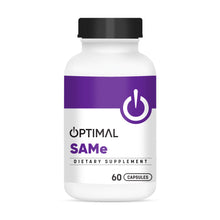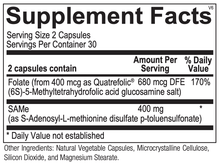- Description
- Benefits
- Supplement Facts
- Other Resources
Clinical Applications
- Provides Mood Support
- Supports Musculoskeletal Health
- Supports Liver Health
S-Adenosylmethionine (SAMe) is the active methyl form of the amino acid methionine. SAMe is necessary for an array of biochemical pathways, including neurotransmitter synthesis, metabolism of homocysteine, and detoxification. As a donator of methyl groups, SAMe supports glutathione production, liver health, musculoskeletal and joint comfort, and a positive mood.
SAMe is a principle methyl donor for biochemical reactions throughout the body. This methyl transfer is critical to reactions involving proteins, phospholipids, DNA, RNA, creatine, hormones, development of cell membranes, degradation of histamine, and formation of norepinephrine and dopamine.
Suggested Use:
1-2 capsules two times per day or as recommended by your health care professional.
*These statements have not been evaluated by the Food and Drug Administration. This product is not intended to diagnose, treat, cure or prevent any disease.
Deficiency
SAMe levels tend to decline as people age. In addition, SAMe is used in the production of the mood elevating neurotransmitter serotonin as a methyl donor. Low levels of SAMe have been associated with certain mood challenges.
Detox Support and Antioxidant Protection
SAMe is an essential molecule in the synthesis of glutathione, a key component of antioxidant and detoxification. Studies show SAMe supports liver health and positively affects the cell-life regulation of hepatocytes.
Mood Health
SAMe appears to support mood health, possibly due to its active role in methylation and involvement in the formation of monoamine neurotransmitters.
Folate
Folate is a water-soluble member of the B-complex vitamins that is critical for maintaining optimal methylation pathways. Malabsorption and genetic defects in the enzyme 5-methyltetrahydrofolate reductase (5-MTHFR) can result in an impaired ability to activate folic acid. Folic acid supports the trans-methylation pathway, which metabolizes homocysteine into cysteine. Increases in oxidative stress may shift homocysteine metabolism towards trans-sulfuration to increase hepatic production of reduced glutathione.

Sign up for weekly offers, news and advice
Plus 15% off your first order

Free shipping for all orders over $125
- Choosing a selection results in a full page refresh.
- Press the space key then arrow keys to make a selection.






